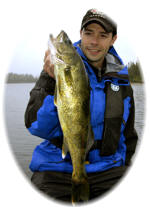

Editors & Publishers
T.J. & Monique Quesnel
The
Ontario Fishing Network
E-Magazine is
published 12 times a year on or near the beginning of every month. Our
magazine is geared to any angler who enjoys fishing of any type in the
wonderfully diverse province of Ontario.
Editorial Submissions: We welcome query letters,
but assume no responsibility for unsolicited materials.
Subscriptions: Subscriptions are FREE of charge
and delivered via email.
You can subscribe
HERE:
Privacy Policy: Unlike other publications We
NEVER make our subscribers list (your email address) available to any
other companies.
Advertising: If you are interested in advertising
please email us.
Circulation - 10,700 email subscribers
© 2009 Due North
Marketing / Ontario Fishing Network / T.J. Quesnel. All rights
reserved. Reproduction of any material without prior written
permission strictly prohibited.
Bay of Quinte Fishing
|
 Weed-Relating
Sunfish on Ice Weed-Relating
Sunfish on Ice
By Tim Allard
Catching sunfish through the ice is a blast. The corkscrewing battle
of big bluegills and pumpkinseeds test the integrity of ultra-light
gear and often gets me giggling. Although pint-sized, these fish are
worthy adversaries. Fickle sunnies challenge even the most
experienced ice anglers. When things get tough, I fish weeds.
Weeds offer a lot to sunfish. They provide cover and hiding spots
from predators. Vegetation's also home to many food items.
Throughout winter the weed-sunfish relationship changes. Healthy
plants are go-to spots at first ice. Sheltered bays and weed flats
are prime early-season areas. Many plants die off by mid-winter.
Weedbeds with still-standing stalks may hold fish. If you canít find
them directly in weeds search in nearby deep water, such as drop
offs or flats outside of bays. At late ice vegetation grows again,
attracting sunfish. They'll stage near spawning sites like shallow,
fertile bays.
 Electronics
can give you an edge in weeds. Underwater cameras show plants, their
health, and if sunfish are present. Sonars are as important, but can
take some tweaking when in shallow-water weed areas. Using sonar's
low-power setting or decreasing the sensitivity is often necessary
to remove clutter for a clearer display. With experience you'll
quick learn to tune your sonar to effectively fish weeds. Electronics
can give you an edge in weeds. Underwater cameras show plants, their
health, and if sunfish are present. Sonars are as important, but can
take some tweaking when in shallow-water weed areas. Using sonar's
low-power setting or decreasing the sensitivity is often necessary
to remove clutter for a clearer display. With experience you'll
quick learn to tune your sonar to effectively fish weeds.
Locating weeds doesn't guarantee success. You still must coax
sunfish to hit. Sunfish may relate to outside or inside edges,
pockets, or the thickest parts of weeds. Be prepared to drill plenty
of holes, moving often until you find biters.
My top sunfish baits are ice jigs. I carry horizontal, vertical, and
45 degree models as sunfish can prefer a specific profile. Lindy's
Fat Boys and Genz Worm, Custom Jigs and Spins Diamond Jig and Two
Spot, and HT Enterprises' Marmooska are proven producers.
Northland's new Bro Bug Collection also holds promise.
Also add profile and flavour to jigs. Artificial soft-bait has its
place, but when the bite's tough maggots are best. I mostly fish
with two to three maggots. Sometimes a single maggot hooked in the
middle is the ticket, while other days it takes four wigglers.
Experimentation is key to catching finicky eaters. Rebait often. New
maggots produce scent and trigger hits.

Attract sunfish using small hops or slow raise-fall sequences.
Switch to pauses and micro-movements to trigger hits. Use spring
bobbers if you don't already. They signal the faintest hit but also
let you rock the jig up-and-down for a natural swimming motion.
When working weeds, divide the water into two parts: above weeds and
in them. Swim the jig down till it's just above the weeds. Work it
here to get fish's attention, trying to raise one to hit the
offering. Sometimes this works, but often you need to dunk the
weeds. Fish down to bottom watching your sonar for fish signals.
Move to the next hole if unsuccessful.
You'll occasionally get hung up fishing weeds and will need to tear
the bait free. Don't get discouraged, it's worth it for the fish
you'll catch. It may also take a few tries to penetrate certain
areas, using a heavier jig helps.
Remember to keep moving, fishing shallow to deep areas. Some holes
will be over impenetrable weeds, while others will be over sweet
spots, like pockets. Plants produce all winter on some water
systems, but they shine at early and late ice. Fish them during
these peak times for steady sunfish action.
|